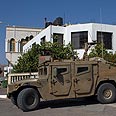
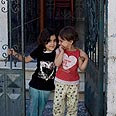
Khadra Kamus was a 16-year-old newlywed when the Israel Defense Forces entered Ghajar. Several weeks before the Six-Day War broke out, she returned from Damascus with household appliances, jewelry, and "everything one should bring to a village after getting married in order to start living," she recalled Wednesday.
"Some of the village's residents decided to escape. We decided to stay. We tied white clothes to sticks and waved at the Israeli army, so that they would see there's no problem."
The army entered, the village was occupied, the fence across from Lebanon was set up several meters north of her house, and she began living an Israeli life. Later on, Kamus and the family she started became citizens of the State of Israel.
Forty-three years later, she can't understand why her government is about to hand her house over to Lebanon, and won't accept the meaning of this move: Dividing the village – the only community she feels she belongs to – between two hostile countries.
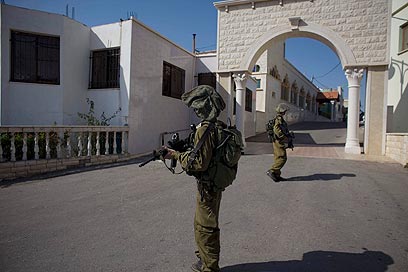
'No idea what's going to happen.' IDF soldiers in Ghajar (Photo: AP)
"Who do I know in Lebanon?" she asks. "No one. I have no family there. Everyone is here. My daughter is in the southern part of the village, so what will happen when I wish to visit my granddaughters?
"Had they moved the entire village together, all the families together with our lands, we wouldn't care if we were Syrian, Israeli, Lebanese, or American – but dividing the village in half? How can you divide a village?"
The road to Ghajar curves along the border fence, under the south Lebanese villages controlled by Hezbollah. There are fruit plantations on the Lebanese side and olive trees on the Israeli side. Both sides are waiting for rain.
Before the village, the border fence curves inward and then continues southwestward, as if the village were a thorn in Israel's flesh. A small path leads to a heavy yellow gate, which has been closing in on Ghajar's 2,200 residents for more than five years. Green signs declare Ghajar a closed military zone.
In light of discussions on an upcoming Israeli withdrawal from the northern part of the village, which is likely to include a transfer of security control of the area to the United Nations, the IDF allowed journalists to visit the village for two hours.
Ghajar's problematic situation stems from its location on the triangle of borders between Israel, Syria, and Lebanon. Before 1967, the village – whose residents are Alawi – was under Syrian control, although old maps determined that its northern half should be controlled by Lebanon. Israel had hesitated before occupying the village, but eventually took over.
The border fence with Lebanon was built north of the village, on the natural route of the Hatsbani River. Following the unilateral pullout from Lebanon in 2002, the UN returned to the old maps and ruled that the border should pass in the middle of the village. The fact that many of the houses are located north of the border did not change this ruling.
Since then, the problem has been waiting to be resolved by the Israeli government. The United States has reportedly been pressing Israel to complete the withdrawal in order to grant the moderate government heading the split country some kind of achievement, while Israel seeks to neutralize the status of the northern part of the village as one of Hezbollah's last "casus belli" (justification for acts of war), at least in terms of the international public opinion.
Ghajar's residents are aware of the fact that their lives have turned into a complicated geopolitical issue, and they don't like it.
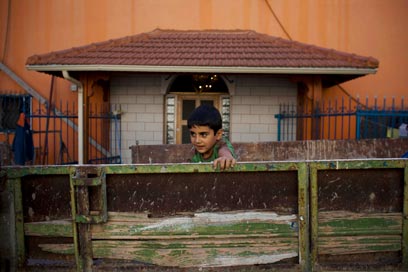
'Family stayed the same, and that's the important thing' (Photo: AP)
Kamus' house is located just a few steps north of the official borderline, and just a few steps south of the actual borderline – the fence set up by the residents opposite Lebanon.
Contrary to the Israeli authorities' version, that the village's houses extended to an area where there were no houses in the past, Khadra Kamus says she was born in the place where she had lunch yesterday. The new house, she says, replaced the old house built from basalt. Houses similar to the old one can be seen in the village even north of the borderline set by the UN in 2000.
'Border here, border there'
Life in the triangle of borders has taught the residents to beware of what they say. There's no use in creating enemies among those who could be your new landlords. In Ghajar ahead of the withdrawal, everyone talks with diplomatic caution.
"I stayed in my house, in my village. I'll stay here," says Kamus. "At first it was under Syrian control, then under Israeli control, but my house, my land, my family and the village have remained the same. That's the important thing."
Ghajar is located on a small hill. Mount Dov, on the slopes of Mount Hermon, rises on its eastern side, while the deep wadi through which the Hatsbani River flows into Israel passes on its western side. Goats from nearby Lebanese villages graze on the fresh flora on its banks.
An IDF jeep patrols Ghajar's main street every few minutes, up to the village's northern end. Beyond the northern fence, separating it from Lebanon, UNIFIL soldiers sit in white guard posts overlooking the village's balconies.
Outside one of the houses' yard, Tawfik Khatib trims a lantana bush growing beyond the house's fence. Khatib, 67, served in the Syrian army when he was 18 and returned to the village before the war.
"There were 700 people in the village at the time," he says. "Half of the families escaped. Anyone who had a son in the Syrian army left the village so as not to be separated from their child. We were not afraid. We wanted to stay next to out house in order to keep our land."
Khatib remembers where the Syria-Lebanon border used to pass. He points to the areas north of the village, which are now being tilled by the Lebanese neighbors from the village of Mara.
"That's where I worked as a child," he says. "My family had 200 dunams (50 acres) there, on the other side. After '67, we told the farmers in Mara to donate what we are entitled to from our land to the Waqf. That's what they're doing."
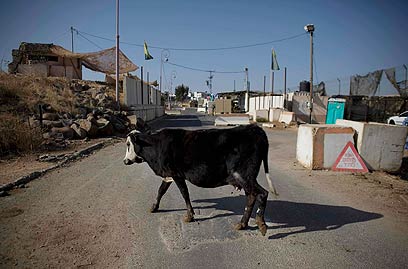
'We enter from same gate as cows' (Photo: AP)
Khatib says he was surprised in 2000, when the borderline was set southward, near the local school. "First they said the border would be here," he points to UNIFIL guard posts, "and then they said here," he points to a house next to his home, "and then they said on the road near the school."
I don't know with whom they finalized this whole thing, he adds.
'There will be a change'
Khatib takes his blue identity card out of the front pocket of his shirt. "I'm an Israeli citizen, I pay all the taxes, but now I'm in prison. We're closed inside the village. Everyone enters from one gate, and the cows enter together with us from the same gate. Every time you go out, you are checked; every time you come in, you are checked. If you bring things into the village, you need special licenses."
But the current situation seems like a reasonable option for the residents compared to the uncertainty of the near future. What will happen when Israel announces a withdrawal? There are different opinions in the village. Most of the residents say they won't even consider a possible division.
One of the residents, who asked to remain anonymous, says he does not think there would be a big difference between today's situation and the future situation.
"The only thing that will change is that the IDF jeep will no longer enter the northern part," he says. But what will happen if Lebanon, or Hezbollah, decide to enter the village. Will they be stopped by UNIFIL? Will Israel rely on the UN to defend its citizens?
"Don’t believe those who say that there won't be any change, that it's just a declaration," says Tawfik Khatib. "It's always begins like this. They promise you it's not significant, but in the end everything changes."
In any event, all the residents vow, they won't let the division take place.
As we exit the village, we see foreign reporters gathering around the local council's spokesman, Najib Khatib. "No one from the government has spoken to us," he tells them. "We have no idea what's going to happen, and not a single government official has informed us about the plan for Ghajar's future. They won't even consult us."
"Look at Netanyahu," says Khadra Kamus about her prime minister. "He uttered a few words about Ghajar, escaped to America, and left the village in fear."
- Follow Ynetnews on Facebook















